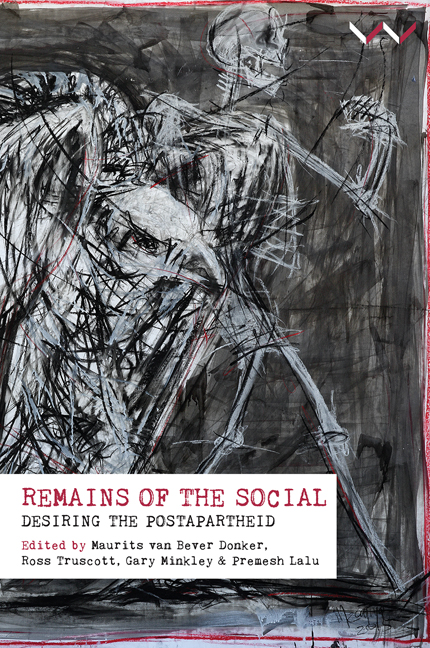Book contents
- Frontmatter
- Contents
- Acknowledgements
- Preface
- Chapter 1 Traversing the Social
- Chapter 2 The Mandela Imaginary: Reflections on Post-Reconciliation Libidinal Economy
- Chapter 3 The Return of Empathy: Postapartheid Fellow Feeling
- Chapter 4 The Ethics of Precarity: Judith Butler's Reluctant Universalism
- Chapter 5 Hannah Arendt's Work of Mourning: The Politics of Loss, ‘the Rise of the Social’ and the Ends of Apartheid
- Chapter 6 Souvenir
- Chapter 7 Re-Cover: Afrikaans Rock, Apartheid's Children and the Work of the Cover
- Chapter 8 The Graves of Dimbaza: Temporal Remains
- Chapter 9 The Principle of Insufficiency: Ethics and Community at the Edge of the Social
- Chapter 10 The Trojan Horse and the ‘Becoming Technical of the Human’
- About the Contributors
- List of Figures
- Index
Chapter 6 - Souvenir
Published online by Cambridge University Press: 21 April 2018
- Frontmatter
- Contents
- Acknowledgements
- Preface
- Chapter 1 Traversing the Social
- Chapter 2 The Mandela Imaginary: Reflections on Post-Reconciliation Libidinal Economy
- Chapter 3 The Return of Empathy: Postapartheid Fellow Feeling
- Chapter 4 The Ethics of Precarity: Judith Butler's Reluctant Universalism
- Chapter 5 Hannah Arendt's Work of Mourning: The Politics of Loss, ‘the Rise of the Social’ and the Ends of Apartheid
- Chapter 6 Souvenir
- Chapter 7 Re-Cover: Afrikaans Rock, Apartheid's Children and the Work of the Cover
- Chapter 8 The Graves of Dimbaza: Temporal Remains
- Chapter 9 The Principle of Insufficiency: Ethics and Community at the Edge of the Social
- Chapter 10 The Trojan Horse and the ‘Becoming Technical of the Human’
- About the Contributors
- List of Figures
- Index
Summary
The key figure in early allegory is the corpse. In late allegory, it is the ‘souvenir’ [Andenken]. The ‘souvenir’ is the schema of the commodity's transformation into an object for the collector. The correspondences are, objectively, the endlessly varied resonances between one souvenir and the others
(Benjamin, Selected Writings 4: 190).In Trust, the American philosopher Alphonso Lingis explains how he never liked to travel with a camera. He had the usual objections of a conscientious tourist: ‘It objectifies people with whom I wanted to interact … there is something false and delusive in trying to fix and stock up images and situations from the past … it was the changes in my heart I brought back home that were alone real’ (49). However, when he was given a camera as a gift, he decided to try it out. At first he only shot images of buildings and landscapes, but one day, while focusing on some willows fringing a lake in Kashmir, he accidentally snapped some men bathing. To his surprise, the men smiled and called out, ‘Thank you!’ Lingis writes that he then realised that taking photographs of people, especially those ‘who have no, and never will have, possessions, is the most innocent gift I could give them’.
There is much to feel uneasy about here: the implication that those without possessions are to be pitied; that they are the passive recipients of a gift, even though the gift in question is a photograph that will not in fact be given, but kept by the one who has transformed these people into an image for his own use and pleasure; and, perhaps above all, the claim that this exchange between perceiver and perceived, tourist and native, rich and poor, is ‘innocent’. This kind of discomfort accompanies the reader through many of Lingis's recent books, which are part travel memoirs and part philosophical meditations about encounters with strangers and the strange. It is evident that Lingis wants to cut through socioeconomic and political determinisms and subjectivations in order to get at what it is for one thinking, feeling, breathing body to encounter another thinking, feeling, breathing body – not a subject-to-subject encounter, still less a human-to-human one, but rather a creaturely one, epidermis to epidermis.
- Type
- Chapter
- Information
- Remains of the SocialDesiring the Postapartheid, pp. 146 - 171Publisher: Wits University PressPrint publication year: 2017



